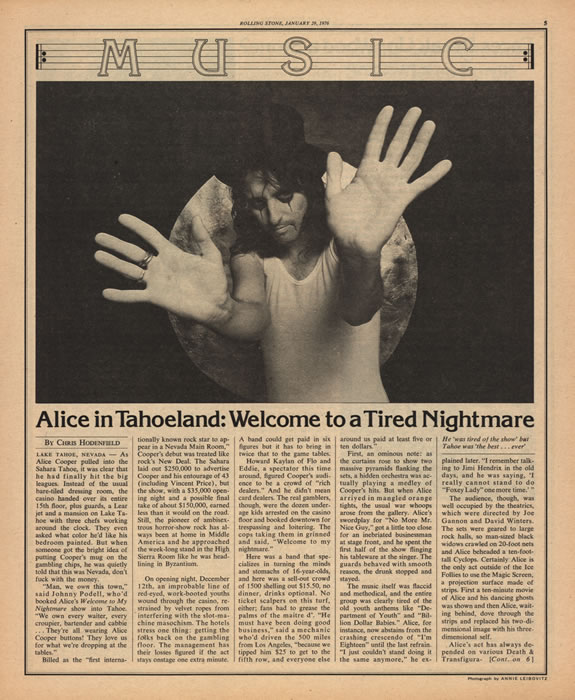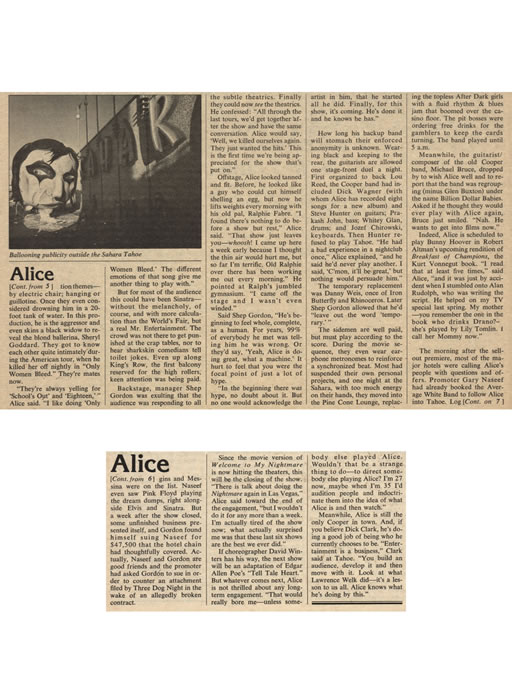Article Database
Alice Cooper in Tahoeland: Welcome to a Tired Nightmare
Lake Tahoe, Nevada - As Alice Cooper pulled into the Sahara Tahoe, it was clear that he had finally hit the big leagues. Instead of the usual bare-tiled dressing room, the casino handed over its entire 15th floor, plus guards, a Lear jet and a mansion on Lake Tahoe with three chefs working around the clock. They never asked what color he'd like his bedroom painted. But when someone got the bright idea of putting Cooper's mug on the gambling chips, he was quietly told that this was Nevada, don't fuck with the money.
"Man, we own this town," said Johnny Podell, who'd booked Alice's Welcome To My Nightmare show into Tahoe. "We own every waiter, every croupier, bartender and cabbie . . . They're all wearing Alice Cooper buttons! They love us for what we're dropping at the tables."
Billed as the "first internationally known rock star to appear in Nevada Main Room," Cooper debut was treated like rock's New Deal. The Sahara laid out $250,000 to advertise Cooper and his entourage of 43 (including Vincent Price), but the show, with a $35,000 opening night and a possible final take of about $150,000, earned less than it would on the road. Still, the pioneer of ambisextrous horror-show rock has always been at home in Middle America and he approached the week-long stand in the High Sierra Room like he was headlining Byzantium.
On opening night, December 12th, an improbable line of red-eyed, work-booted youths would through the casino, restrained by velvet ropes from interfering with the slot-machine masochism. The hotels stress one thing: getting the folks back on the gambling floor. The management has their losses figured if the act stays onstage one extra minute. A band could get paid in six figures but it has to bring in twice that to the game tables.
Howard Kaylan of Flo and Eddie, a spectator this time around, figured Cooper's audience to be a crowd of "rich dealers." And he didn't mean card dealers. The real gamblers, though, were the dozen under-age kids arrested on the casino floor and booked downtown for trespassing and loitering. The cops taking them in grinned and said, "Welcome to my nightmare."
Here was a band that specializes in turning the minds and stomachs of 16-year-olds, and here was a sell-out crowd of 1500 shelling out $15.50, no dinner, drinks optional. No ticket scalpers on this turf, either; fan had to grease the palms of the maitre d'. "He must have been doing good business," said a mechanic who'd driven the 500 miles from Los Angeles, "because we tipped him $25 to get to the fifth row, and everyone else around us paid at least five or ten dollars."
First, an ominous note: as the curtains rose to show two massive pyramids flanking the sets, a hidden orchestra was actually playing a medley of Cooper's hits. But when Alice arrived in mangled orange tights, the usual war whoops arose from the gallery. Alice's swordplay for "No More Mr. Nice Guy," got a little too close for an inebriated businessman at stage front, and he spent the first half of the show flinging his tableware at the singer. The guards behaved with smooth reason, the drunk stopped and stayed.
The music itself was flaccid and methodical, and the entire group was clearly tired of the old youth anthems like "Department of Youth" and "Billion Dollar Babies." Alice, for instance, now abstains from the crashing crescendo of "I'm Eighteen" until the last refrain. "I just couldn't stand doing it the same anymore," he explained later. "I remember talking to Jimi Hendrix in the old day, and he was saying, 'I really cannot stand to do "Foxy Lady" one more time.' "
The audience, though, was well occupied by the theatrics, which were directed by Joe Gannon and David Winters. The sets were geared to large rock halls, so man-sized black widows crawled on 20-foot nets and Alice beheaded a ten-foot-tall Cyclops. Certainly Alice is the only act outside of the Ice Follies to use the Magic Screen, a projection surface made of stripes. First a ten-minute movie of Alice and his dancing ghosts was shown and then Alice, waiting behind, dove through the stripes and replaced his two-dimensional image with his three-dimensional self.
Alice's act has always depended on various Death & Transfiguration themes — by electric chair, hanging or guillotine. Once they even considered drowning him in a 20-foot tank of water. In this production, he is the aggressor and even skins a black widow to reveal a blond ballerina, Sheryl Goddard. They got to know each other quite intimately during the American tour, when he killed her off nightly in "Only Women Bleed." They're mates now.
"They're always yelling for 'School's Out' and 'Eighteen'," Alice said. "I like doing 'Only Women Bleed.' The different emotions of that song give me another thing to play with."
But for most of the audience this could have been Sinatra – without the melancholy, of course, and with more calculation that the World's Fair, but a real Mr. Entertainment. The crowd was not there to get punished at the crap tables, nor to hear sharkskin comedians tell toilet jokes. Even up along King's Row, the first balcony reserved for the high rollers, keen attention was being paid.
Backstage, manager Shep Gordon was exulting that the audience was responding to all the subtle theatrics. Finally they could now see the theatrics. He confessed: "All through the last tour, we'd get together after the show and have the same conversation. Alice was say, 'Well, we killed ourselves again. They just wanted the hits.' This is the first time we're being appreciated for the show that's put on."
Offstage, Alice looked tanned and fit. Before, he looked like a guy who could cut himself shelling an egg, but now he lifts weights every morning with his old pal, Ralphie Fabre. "I found there's nothing to do before a show but rest," Alice said. "That show just leaves you — whoosh! I came up here a week early because I thought the thin air would hurt me, but so far I'm terrific. Old Ralphie over there has been working me out every morning." He pointed at Ralph's jumbled gymnasium. "I came off the stage and I wasn't even winded."
Said Shep Gordon, "He's beginning to feel whole, complete, as a human. For years, 99% of everybody he met was telling him he was wrong. Or they'd say, 'Yeah, Alice is doing great, what a machine.' It hurt to feel that you were the focal point of just a lot of hype.
"In the beginning there was hype, no doubt about it. But no one would acknowledge the artist in him, that he started all he did. Finally, for this show, it's coming. He's done it and he knows he has."
How long his backup band will stomach their enforced anonymity is unknown. Wearing black and keeping to the rear, the guitarists are allowed one stage-front duel a night. First organized to back Lou Reed, the Cooper band had included Dick Wagner (with whom Alice has recorded eight songs for a new album) and Steve Hunter on guitars; Prakash John, bass; Whitey Glan, drums; and Jozef Chirowski, keyboards. Then Hunter refused to play Tahoe. "He had a bad experience in a nightclub once," Alice explained, "and he said he's never play another. I said, 'C'mon, it'll be great,' but nothing would persuade him."
The temporary replacement was Danny Wies, once of Iron Butterfly and Rhinoceros. Later Shep Gordon allowed that he'd "leave out the word 'temporary.' "
The sidemen are well paid, but must play according to the score. During the movie sequence, they even wear earphone metronomes to reinforce a synchronized beat. Most had suspended their own personal projects, and one night at Sahara, with too much energy on their hands, they move into the Pine Cone Lounge, replacing the topless After Dark girls with a fluid rhythm & blues jam that boomed over the casino floor. The pit bosses were ordering free drinks for the gamblers to keep the cards turning. The band played until 5 a.m.
Meanwhile, the guitarist/composer of the old Cooper band, Michael Bruce, dropped by to wish Alice well and to report that the band was regrouping (minus Glen Buxton) under the name Billion Dollar Babies. Asked if he thought they would every play with Alice again, Bruce just smiled. "Nah. He wants to get into films now."
Indeed, Alice is scheduled to play Bunny Hoover in Robert Altman's upcoming rendition of Breakfast of Champions, the Kurt Vonnegut book. "I read that at least five times," said Alice, "and it was just by accident that I stumbled onto Alan Rudolph, who was writing the script. He helped on my TV special last spring. My mother — you remember the one in the book who drinks Drano? — she's played by Lily Tomlin. I call her Mommy now."
The morning after the sellout premiere, most of the major hotels were calling Alice's people with questions and offers. Promoter Gary Naseef had already booked the Average White Band to follow Alice into Tahoe. Log gins and Messina were on the list. Naseef even saw Pink Floyd playing the dream dumps, right alongside Elvis and Sinatra. But a week after the show closed, some unfinished business presented itself, and Gordon found himself suing Naseef for $47,500 that the hotel chain has thoughtfully covered. Actually, Naseef and Gordon are good friends and the promoter has asked Gordon to sue in order to counter an attachment filed by Three Dog Night in the wake of an allegedly broken contract.
Since the movie version of Welcome To My Nightmare is now hitting theatres, this will be the closing of the show. "There is talk about doing the Nightmare again in Las Vegas," Alice said toward the end of the engagement, "but I wouldn't do it for any more than a week. I'm actually tired of the show now; what actually surprised me was that these last six shows are the best we ever did."
If choreographer David Winters has his way, the next show will be an adaptation of Edgar Allen Poe's "Tell Tale Heart." But whatever comes next, Alice is not thrilled about any long term engagement. "That would really bore me — unless somebody else played Alice. Wouldn't that be a strange thing to do — to direct somebody else playing Alice? I'm 27 now, maybe when I'm 35 I'd audition people and indoctrinate them into the idea of what Alice is and then watch."
Meanwhile, Alice is still the only Cooper in town. And, if you believe Dick Clark, he's doing a good job of being who he currently chooses to be. "Entertainment is a business," Clark said at Tahoe. "You build an audience, develop it and then more with it. Look at what Lawrence Welk did — it's a lesson to us all. Alice knows what he's doing by this."





